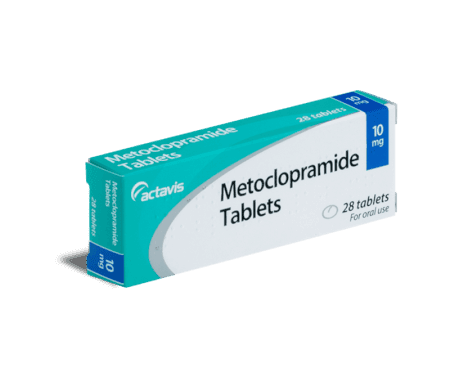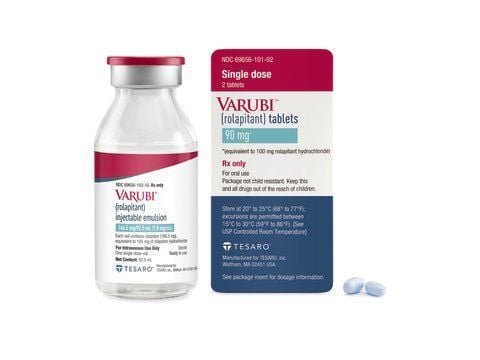This is an automatically translated article.
Antiemetic drugs are a group of drugs used for the purpose of reducing the symptoms of vomiting and nausea in patients due to chemotherapy, motion sickness, pregnancy, after surgery... or due to a medical condition. some. Antiemetics have many different forms of use such as intravenous antiemetics, tablets, patches, syrups, intramuscular injections. When to prescribe intravenous antiemetics and how to use them?
1. Injectable antiemetics
Antiemetics are drugs that work to treat vomiting and nausea in patients with many different causes. Most, with different causes of vomiting, will have different indications for using antiemetics. The effectiveness of antiemetic drugs also depends on certain drug groups:
Antihistamines, anticholinergics: antiemetic thanks to their ability to inhibit the vomiting reflex. Serotonin antagonists work by blocking the transmission of signals to and from the vomiting center in the brain. Indications for intravenous antiemetics:
For people over 20 years old:
The drug helps to reduce the symptoms of nausea and vomiting in patients with migraine, cancer undergoing chemotherapy, radiation therapy, people in the reproductive period or infected with infectious diseases. The drug has a good effect on controlling vomiting in patients after surgery. Assist in the insertion of a tube or tube to the intestine. For people under 20 years of age, the indications for injectable antiemetics are still limited and are not the first choice. Use only when:
The patient needs to insert the tube into the intestine. The patient has symptoms of vomiting with no known cause. The patient is being treated with radiation therapy, chemotherapy with vomiting. Antiemetic drugs in the form of injection and specific indications, dosage used:
Dolasetron: 12.5mg dose intravenously at the onset of signs of nausea and vomiting. Granisetron is available in both oral and injectable forms. Use 1mg / time, 3 times a day. Ondansetron: 4 to 8 mg orally or intravenously, repeat dose after 8 hours if necessary. Indications of dolasetron, granisetron and ondansetron in patients receiving chemotherapy regimens with high emetic potential. However, the disadvantage of these drugs is that they can cause fatigue, drowsiness, hiccups for patients.
Palonosetron: indicated for vomiting prophylaxis in cases of chemotherapy, 0.25mg intravenously 30 minutes before chemotherapy. Metoclopramide: 5-20mg orally or intravenously, 3 to 4 times a day. The drug is indicated for the initial treatment of patients with mild vomiting. In addition, perphenazine intramuscularly, prochlorperazine intravenously also has a very good effect on reducing vomiting.
2. Notes on using antiemetics
Antiemetic drugs, although effective quickly, also have certain side effects. To limit the unwanted effects of antiemetics, when using it, it is necessary to note a few things as follows:
With the group of antihistamines, most of them cause drowsiness, a feeling of dry nose, dry mouth. Therefore, in case the patient must drive or operate machinery, caution should be exercised. It is possible to choose other groups of alternative antiemetic drugs to avoid affecting work. Some corticosteroids are also used as antiemetics but are prone to secondary acne, dehydration, and other side effects. Consult your doctor before taking the medicine. Other classes of antiemetics should still be preferred over corticosteroids. Dopamine receptor blockers can cause fatigue, dizziness, tinnitus or muscle spasms. You should arrange reasonable work to have time to rest during treatment. The NK1 receptor blocker group has an effect on urine output, reducing urine output in patients using the drug. Some drugs to treat other diseases can reduce the effectiveness of treatment, increase the side effects of antiemetics such as arthritis drugs, tranquilizers, antidepressants or drugs to treat related diseases. Intravenous antiemetic drugs after injection will quickly follow the circulatory system throughout the body, so side effects often occur very quickly. It should be noted, closely monitored throughout the treatment process, if you see any abnormal signs, you must immediately report to the doctor and medical staff for timely treatment and support. In case of overdose, monitor symptoms, contact your doctor for specific handling instructions. Do not arbitrarily use drugs, increase or decrease the dose of drugs, change drugs without a doctor's prescription. There are many different types of antiemetic drugs, most of which have specific indications for each specific case. Therefore, do not arbitrarily use antiemetic drugs without a doctor's prescription, especially injectable antiemetics. Please consult a doctor before use to avoid taking the wrong medicine, not improving vomiting but also affecting health.
Please dial HOTLINE for more information or register for an appointment HERE. Download MyVinmec app to make appointments faster and to manage your bookings easily.













